Selected Biography
-
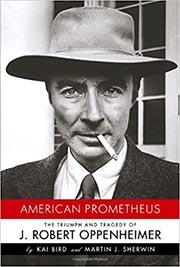
American Prometheus : The Triumph and Tragedy of J. Robert Oppenheimer
by Kai Bird and Martin J. Sherwin
American Prometheus sets forth Oppenheimer's life and times in revealing and unprecedented detail. Exhaustively researched, it is based on thousands of records and letters gathered from archives in America and abroad, on massive FBI files and on close to a hundred interviews with Oppenheimer's friends, relatives and colleagues. -
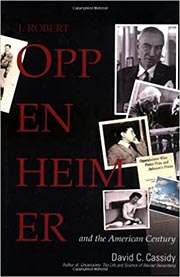
J. Robert Oppenheimer : And the American Century
by David C. Cassidy
Oppenheimer is shown to have been a brilliant, complex and troubled individual whose personal failings helped shape the way science and government have interacted ever since. While he focuses on Oppenheimer, Cassidy does a superb job of examining how theoretical physics came of age in America during the early part of the 20th century and how many of the country's greatest scientists permitted science to be subsumed by a military-industrial complex. -
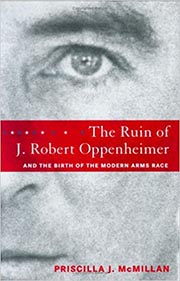
The Ruin of J. Robert Oppenheimer and the Birth of the Modern Arms Race
by Priscilla McMillan
This biography focuses on physicist J. Robert Oppenheimer's role in the U.S. nuclear program from 1945 to 1955 and the conflict at the time between people advocating arms control and those in favor of the development of more powerful thermonuclear weapons. McMillan presents an interesting, well documented, view of the events that she feels contributed to the acceleration of the Cold War arms race. -
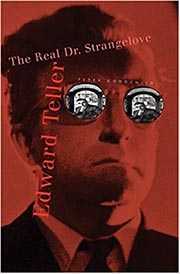
Edward Teller : The Real Dr. Strangelove
by Peter Goodchild
Goodchild's biography draws on interviews with more than fifty of Tellers colleagues and friends. Their voices echo through the book, expressing admiration and contempt, affection and hatred, as we observe Tellers involvement in every stage of building the atomic bomb, and his subsequent pursuit of causes that drew the world deeper into the Cold War alienating many of his scientific colleagues even as he provided the intellectual lead for politicians, the military, and presidents as they shaped Western policy. -

Brotherhood of the Bomb: The Tangled Lives and Loyalties of Robert Oppenheimer, Ernest Lawrence and Edward Teller
by Gregg Herken
The story of the twentieth century is largely the story of the power of science and technology. Within that story is the incredible tale of the human conflict between Robert Oppenheimer, Ernest Lawrence, and Edward Teller-the scientists most responsible for the advent of weapons of mass destruction. -
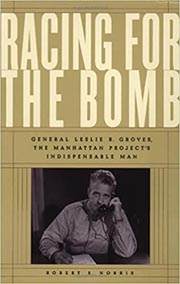
Racing for the Bomb: General Leslie R. Groves, the Manhattan Project's Indispensable Man
by Robert S. Norris
Racing for the Bomb tells the gripping story of how Groves - more than any single scientist - was crucial to the Manhattan Project's success. Robert Norris portrays Groves at center stage making nearly every key decision to build, test, and use the bomb. -
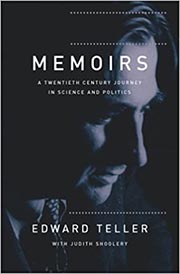
Memoirs: A Twentieth-Century Journey in Science and Politics
by Edward Teller and Judith Shoolery
The fascinating recollections of one of the most brilliant and controversial scientists of the 20th century. Edward Teller's autobiography is a record of one of the major players in nuclear science in the mid-century, and in United States defense policy during the Cold War. -
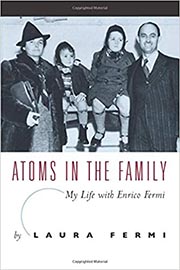
Atoms in the Family
by Laura Fermi
In this absorbing account of life with the great atomic scientist Enrico Fermi. Laura Fermi traces her husband's career from his childhood, when he taught himself physics, through his rise in the Italian university system concurrent with the rise of fascism, to his receipt of the Nobel Prize, and developing the world's first nuclear reactor. -
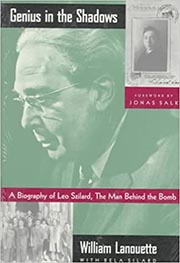
Genius in the Shadows: A Biography of Leo Szilard, The Man Behind the Bomb
by William Lanouette
Leo Szilard has long been overshadowed by such luminaries as Einstein, Oppenheimer, and Enrico Fermi--with whom he designed the first nuclear reactor in 1942. This entertaining biography presents a focused look at the shy, witty eccentric--who worked first to prevent, then to hasten, and finally to ban nuclear weapons. -

Enrico Fermi: Physicist
by Emilio Sergè
Student, collaborator and lifelong friend of Enrico Fermi, Emilio Segrè presents a rich, well-rounded portrait of the scientist, his methods, intellectual history, and achievements. Explaining in nontechnical terms the scientific problems Fermi faced or solved, Enrico Fermi, Physicist contains illuminating material concerning Fermi's youth in Italy and the development of his scientific style. -

The Last Man Who Knew Everything: The Life and Times of Enrico Fermi, Father of the Nuclear Age
by David N. Schwartz
-
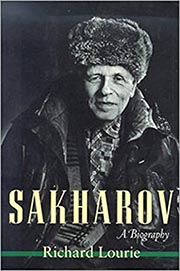
Sakharov: A Biography
by Richard Lourie
This biography of the renowned physicist, Soviet dissident and Nobel Peace Prize winner weaves the details of Sakharov's life together with the history of the Soviet Union. Lourie traces the young Sakharov's upbringing and early years, his love of physics, and his survival under the brutal conditions of the Stalinist Soviet Union in war and peace and to his work on the Soviet H-bomb project. -
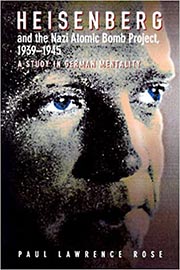
Heisenberg and the Nazi Atomic Bomb Project: A Study in German Culture
by Paul Lawrence Rose
This biography of Werner Heisenberg attempts to shatter the perception that the German physicist and mathematician sabotaged the Nazi atomic bomb project. -

Uncertainty: The Life and Science of Werner Heisenberg
by David C. Cassidy
Werner Heisenberg's genius and his place at the forefront of modern physics are unquestioned. His decision to remain in Germany throughout the Third Reich and his role in Hitler's atomic bomb project are still topics of heated debate. Uncertainty is David Cassidy's compelling portrait of this brilliant, ambitious, and controversial scientist. It is the definitive Heisenberg biography, as well as a striking evocation of the development of quantum physics, the rise of Nazism, and the dawn of the atomic age. -

'Surely You're Joking, Mr. Feynman!'
by Richard Feynman
Richard Feynman, winner of the Nobel Prize in physics and participant in the Manhattan Project, presents his memoirs in this autobiography. It is divided into five parts in which he reflects on his childhood, college and graduate years, contributions to the atomic bomb, work at Cornell and California Institute of Technology, and later life. -
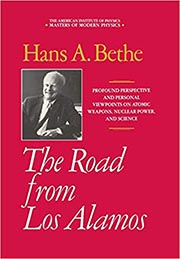
The Road from Los Alamos
by Hans Bethe
This book by Nobel Laureate Hans Bethe, assembles some of his most powerful essays written after World War II. A strong advocate for nuclear disarmament, Bethe focuses his writings on the hydrogen bomb, weapons research, arms control, and nuclear power. -
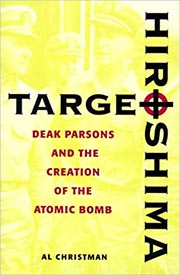
Target Hiroshima: Deak Parsons and the Creation of the Atomic Bomb
by Albert B. Christman
A biography of Deak Parsons, the modest ordance chief, weaponeer, and associate director at Los Alamos who turned the scientists' nuclear invention into a weapon, worked on the first postwar tests of the atomic bomb, and established post-war Navy policy in atomic matters. -
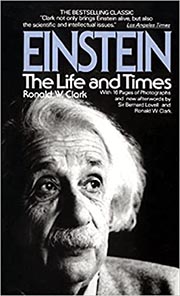
Einstein: The Life and Times
by Ronald W. Clark
Ronald W. Clark's definitive biography of Einstein, the Promethean figure of our age, goes behind the phenomenal intellect to reveal the human side of the legendary absent-minded professor. -

Albert Einstein: A Biography
by Albrecht Folsing
Drawing on an unprecedented number of sources, Albrecht Folsing throws into fresh relief the remarkable life of Einstein, approaching the man through the science and situating him in the creatively charged times in which he thrived. -
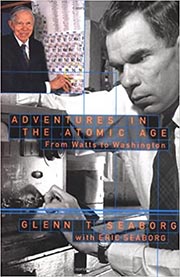
Adventures in the Atomic Age: From Watts to Washington
by Glenn T. Seaborg, Eric Seaborg
This unpretentious memoir, published after its author's death in 1999, opens windows into both the development of nuclear science in America and the mentality of the mainstream nuclear community. -

A Chemist in the White House: From the Manhattan Project to the End of the Cold War
by Glenn T. Seaborg
Nobel Laureate Glenn T. Seaborg, who worked on the Manhattan Project in his early career, played a key role in U.S. science and arms-control policy and served both as a Presidential Cabinet member and as head of the Atomic Energy Commission. This memoir, filled with photos, anecdotes, and analysis, provides an insider's look at national science policy-making from World War II through the Bush I administration. -

Robert Oppenheimer: Letters and Recollections
by J. Robert Oppenheimer, Charles Weiner (Editor), Alice K. Smith (Editor)
This work consists primarily of a compilation of letters to and from J. Robert Oppenheimer, through about 20 years of his adult life. The authors intertwine the letters and recollections with information about their contents and Oppenheimer's life. -

J. Robert Oppenheimer: Shatterer of Worlds
by Peter Goodchild
This book is an account of the life of J. Robert Oppenheimer, "the father of the atomic bomb" and scientific director of the Manhattan Project. It examines Oppenheimer's crisis of conscience after the dropping of the bombs and his efforts to steer the government away from the development of the H-bomb. Written to accompany a PBS documentary on Oppenheimer. -

Rabi: Scientist and Citizen
by John S. Rigden
A biography of I.I. Rabi, one of the most influential physicists of the 20th century. Rabi's work as an advisor at Los Alamos and his relationship with Oppenheimer are explored extensively, as are his attempts to reconcile physics and religion.